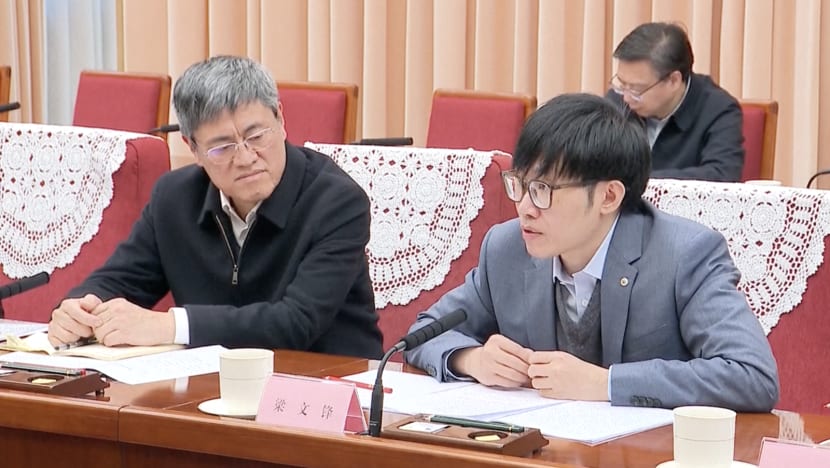China’s new face of AI: Who is DeepSeek founder Liang Wenfeng?
The low-profile 40-year-old is winning widespread praise for keeping artificial intelligence costs affordable and giving Western firms and tech entrepreneurs a run for their money.

Liang Wenfeng (right), the founder of Chinese AI startup DeepSeek, speaks at a symposium chaired by Chinese Premier Li Qiang on Jan 20, 2025. (Photo: CCTV Plus)
SINGAPORE: While Chinese AI firm DeepSeek drums up excitement as well as competition fears in Silicon Valley with the launch of its breakthrough R1 AI assistant, global attention has turned to founder Liang Wenfeng, a 40-year-old former hedge fund manager with a degree in artificial intelligence (AI).
Little is known about Liang outside of Chinese state media reports but speaking during a national dialogue session held last July, he talked about his vision of keeping costs affordable and challenging the Western artificial intelligence boom.
The wide-ranging interview saw him weighing in on the Hangzhou-based startup’s progress as well as China’s overall AI development.
“China’s AI cannot remain a follower forever,” Liang said, adding that Chinese companies had grown “accustomed to leveraging technological innovations developed elsewhere”.
“China must gradually transition from being a beneficiary to a contributor, rather than continuing to ride on the coattails of others.”
THE “SAM ALTMAN” OF CHINA
Liang hails from the city of Zhanjiang in China’s southern Guangdong province, known for its vast shipyards and engineering works.
Adept at mathematics, he enrolled at Zhejiang University, and graduated with a degree in AI, according to a report by Chinese news outlet CGTN.
In 2015, he co-founded High-Flyer, a quantitative hedge fund relying on mathematical modelling, statistical analysis and computer algorithms to incorporate AI into trading strategies - predicting market trends and helping to make data-driven investment decisions.
Under his wing, the company grew its assets more than tenfold over a four-year span - from 1 billion yuan (US$138 million) in 2016 to more than 10 billion yuan by 2019, according to official information provided.
Tellingly, it also bought more than 10,000 Nvidia graphics processing units before US AI chip sanctions on China kicked in.
“Over the years, High-Flyer Quant spent a large portion of profits on AI to build a leading AI infrastructure and conduct large-scale research,” the company said in a statement in 2023.
Writing in a report published on Jan 27, CNN’s executive business editor David Goldman described Liang as “an AI evangelist”.
“Liang has become the Sam Altman of China, an evangelist for AI technology and investment in new research,” Goldman said, referring to OpenAI’s CEO.
“His hedge fund, High-Flyer, focuses on AI development (and) is one of scores of startups that have popped up in recent years seeking big investment to ride the massive AI wave that has taken the tech industry to new heights.”
American investigative journalist and non-fiction author Gregory Zuckerman recalled how Liang had once contributed a preface for the Chinese translation of his 2019 book about American mathematician Jim Simons, titled ‘The Man Who Solved The Market’.
In it, the DeepSeek founder spoke about how Simons played a pivotal role in shaping his work and beliefs about using math to analyse trade figures and financial data.
“Whenever I encounter difficulties at work, I recall Simons’s words: ‘There must be a way to model prices’,” Liang said.
“The publication of this book unravels many previously unresolved mysteries and brings us a wealth of experiences to learn from.”
KEEPING CHINESE AI AFFORDABLE
AI costs have soared due to the complexity of models, specialised talent and demand for high-performance software. US companies like Microsoft and Meta have announced plans to invest billions in AI this year.
But Liang has been strongly determined to keep costs and prices low and affordable for users.
“Our principle is neither to sell at a loss nor to seek excessive profits. The current pricing allows for a modest profit margin above our costs,” Liang said in comments carried by Chinese state broadcaster CCTV News.
“Grabbing users wasn’t our primary goal. We reduced prices because we believe that both AI and API (application programming interface) services should be affordable and accessible to everyone.”
As the race for global AI domination accelerates, technological challenges continue to persist in China and firms have been scrambling to create their own AI-powered chatbots in the wake of OpenAI’s 2022 ChatGPT release.
Liang has been vocal about China’s potential as an AI giant, and he has shared hopes for Chinese AI innovations.
“Innovation is undoubtedly costly, and our past tendency to adopt existing technologies was tied to China’s earlier developmental stage but today, China’s economic scale and the profits of giants like ByteDance and Tencent are globally significant,” Liang said.
“What we lack isn’t capital but confidence and the ability to organise high-calibre talent for effective innovation. We believe that with economic development, China must gradually transition from being a beneficiary to a contributor, rather than continuing to ride on the coattails of others.”
While sharing his visions for DeepSeek and Chinese AI, he also identified “gaps” for China in the global technological war, citing “the US embargo” on high-end semiconductor microchips as being a major challenge.
“First, there’s a gap in training efficiency,” Liang said. “We estimate that China’s best models likely require twice the compute power to match top global models due to structural and training dynamics gaps.”
“Data efficiency is also half as effective, meaning we need twice the data and compute for equivalent results. Combined, that’s four times the resources. Our goal is to continuously narrow these gaps.”
“DEEPSEEK AI MASTER”
Liang has yet to make any public statement on DeepSeek’s sudden popularity, but Chinese netizens expressed awe over his achievements and praised his efforts.
“It only goes to show how you don’t need to be (some) tech bro to achieve global AI success,” said one user on the popular microblogging platform Sina Weibo. “Liang Wenfeng shows that China can take something and make it ten times better for a fraction of the cost.”
A Weibo user with the handle Jianguo, called Liang a “DeepSeek AI master” and talked about how the former hedge fund manager managed to use his skills and beliefs to “revolutionise” Chinese AI.
Another described Liang’s achievements as being “akin to a nuclear bomb” in the global science and technology field.
"China’s youths are gradually shining brightly, which is this country’s greatest luck."
Sharing a video listing Liang’s academic background, one user called him a “complete genius”.
“(He) came from a normal family, earned achievements in quantitative investments and now his research into AI also resulted in massive success.”


















